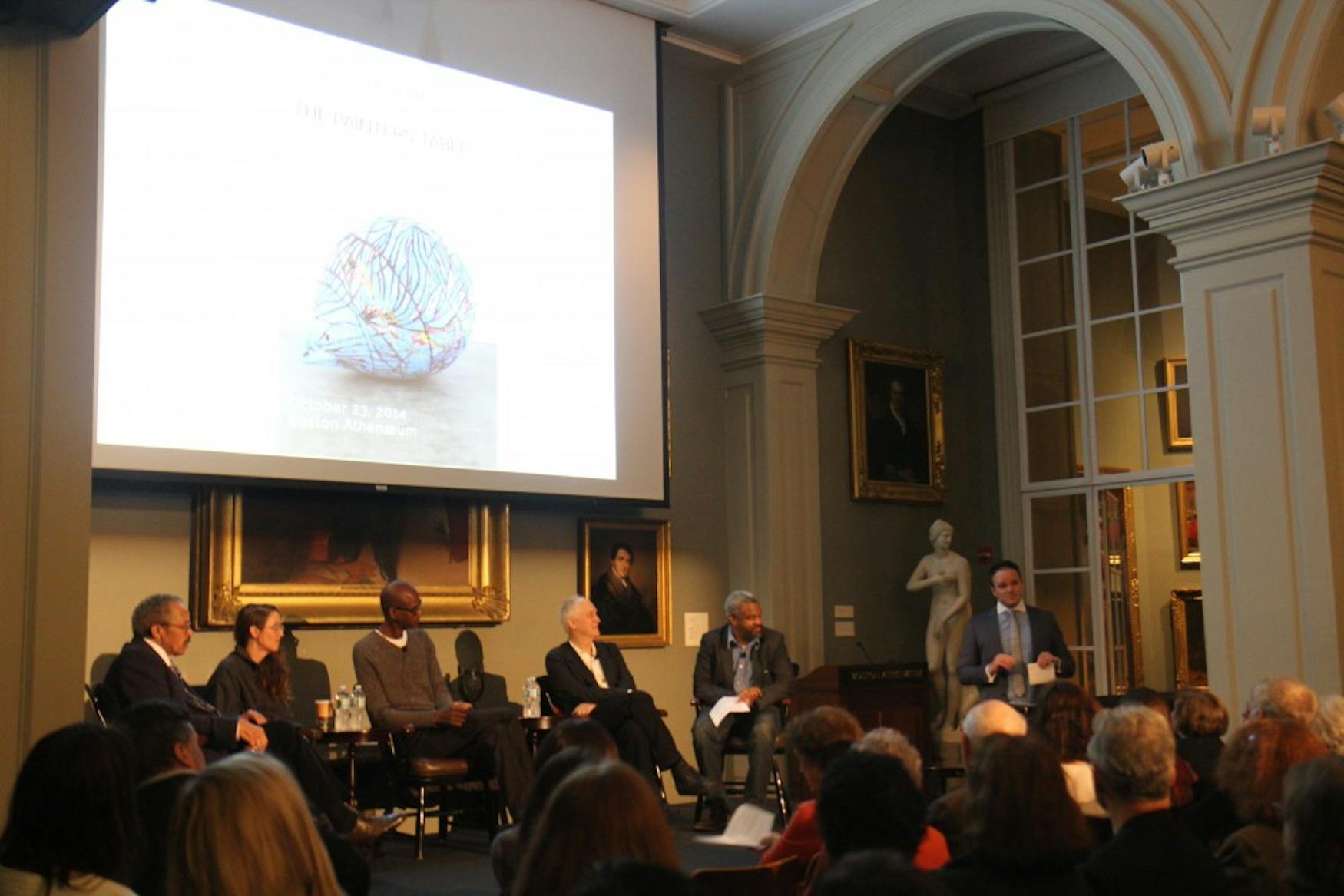Boston Athenaeum presents art symposium
“I only have an intellectual life because of artists,” said Chris Bedford, director of the Rose Art Museum, addressing a room teeming with visitors who were waiting to hear four of today’s prominent artists talk about their work.
This artists’ panel was part of an all-day symposium presented by the Rose at the Boston Athenaeum titled “The Painter’s Table: Abstract and Otherwise.” The symposium was engaged in discussing artists in the field today, focusing on work of abstract artist Mark Bradford. The programming included three segments—the first included two paper presentations from professors of art and art history, the second a “curator’s roundtable” and the third an artists’ panel. Bradford’s exhibit Mark Bradford: Sea Monsters is currently on view at the Rose.
At 6 p.m. the artists’ panel—the most well-attended event of the day—began. Artwork surrounded the audience and guest speakers. The ornate and luxurious room was full of ancient sculptures as well as more currently ones from the 18th and 19th centuries.
The panel included four established artists—Jack Whitten, Laura Owens, Mark Bradford and David Reed. Hamza Walker, director of education and curator of the Renaissance Society at the University of Chicago, moderated the panel. He took 15 minutes to ask each artist a few questions about their work.
Walker started with Whitten, an artist who was highlighted in an exhibition at the Rose titled Light Years: Jack Whitten 1971-73 in the fall of 2013. Walker asked about the problem of transcending cultural specificity as an artist. He questioned whether Whitten thought that it was important to label artwork as being by a “black artist” or whether it would be better not to label it.
Whitten answered the question without hesitation. “It is important that people know that I’m black—I insist that they know.” He then went on to talk about the racism he was confronted with while growing up in Alabama during segregation and then moving to New York to attend college. He discussed the fellow painters he worked with and his experiments in abstract painting, especially his experiments with the speed of abstraction. Sometimes, he said he got so fast at painting that he would cover the whole canvas in one stroke.
Reed came next and was asked about the concept of geometric abstraction, specifically working in the late 1970s and early 1980s. Before Reed answered the question, he took a moment to notice how extraordinary the symposium was in the context of modern times. “There were times in the ’70s when I thought there would never be interest in painting again,” he said, mentioning that given that feeling in the ’70s, the panel was a moving occasion for him.
Reed then launched into his discussion of his “Neo Geo” artwork, a style that he described as “abstract and something else at the same time.”
He talked about his particular focus on cinematic-themed artwork. “Sometimes, I think I’m not really a painter, but I use paint to create cinema,” he said. Is the painting dead because of the cinema and photography industries, asked Walker. Not at all, Reed argued; like giving painting a vampire’s kiss, cinema and photography have made painting immortal.
Walker turned to Owens next and asked her about feminism in abstract art, but did not get the answer he expected. Owens told Walker that she took issue with the word “abstraction”—ironically, a term in the title of the symposium. “It’s a painting,” she said, suggesting that the object of the painting is already in another realm than the physical, real object anyway.
Walker saved Bradford, the honoree of the symposium, for last, asking him about, as Walker termed it, “the real” in his work. But Bradford said that he has never actually felt like his artwork is real. He discussed how he has always seemed to embody the urbanity of what it means to be a black man in his street work. But he has also taken on the role of a studio artist and has his work exhibited in galleries. “I like the idea of not being pure,” Bradford said.
“One of the things I’ve learned today is that painting is pretty complicated,” Reed said at the end of the panel discussion. Based on Thursday’s dialogue, I think the whole audience would agree.




Please note All comments are eligible for publication in The Justice.